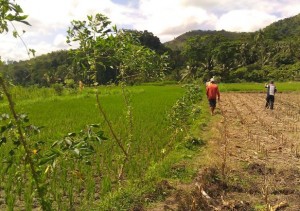We decided after the 2011 OMC to learn more about the culture and social economic of rural area in Indonesia. We found that majority of the people in rural area are farmers. To understand the rural area in Indonesia, we need to start with the farming sector. Our 19th discovery trip in 2012 adopted this theme, “Understanding the Farming Culture”. We did the discovery trip in Bantul, Jogjakarta. We were guided by our partner, “Yayasan Sahabat Setia” or YSS. YSS was developing new farming technology for Sultan Hamengkubuwono, the governor of Jogjakarta.
Dry Rice Field
We found that the farming culture is tightly related to the season. Most of the activities happen during the planting and harvesting seasons, which occurred in February and March. The village population could double during these two months. Particularly in this village, most of the men would be seeking employment in the city because nothing they could do besides waiting for the paddies to grow.
We also learnt that the culture is also tied to the land. Farmer with large land tends to have bigger family. Majority of the farmers have very small land and cannot live out of the land. These farmers are called “Petani Gurem”. Thus, many of the farmers will not encourage their children to stay in farming business because they just do not have enough land to be divided anymore.
Because of their income are very tight, any disruptive event, such as sickness or drought, is very catastrophic. This allows the speculators to come in and buy the harvest for cheap. These speculators are called Ijon. In this Ijon system, the speculators are buying the crops while they are still green or not ready to be harvested. The crop is sold very cheap and sometime not enough to buy the seed for the next planting cycle. The Ijon system, which depressed the farmer’s income, also reduces the capability for the farmer to save. The farmers then do not have capital to invest in new technology, buy more land, adapt to price fluctuations, sell to different market (pasar), and possibly plant higher value crops.
We observed from our interviews two solutions that were tried by our partner. First, they encourage farmers not to divide their already small farm land. Because, the smaller their land, the less income and the higher possibility for them to be forced to sell the land. To obtain the ownership of the land within the farmer’s family, they have to send their children to college so that they could get non-farming jobs. We think this solution is very wise although it is counter intuitive. We thought we need to increase the people in the farming sector to preserve the culture and its tradition.
Second, they develop mentorship program in villages. The program is divided into three steps. The first step is trust building. They found that in general farmers are using very traditional method and have low education level. Because of these, they are often exploited by a lot outsider. Overtime, they are becoming traumatic to any changes and negative toward outsider. It takes time and effort to gain their trust. We need to show them our true intention by real work. They need to see it with their own eyes that our new technology is better.
The second step is mentorship. After we gain the farmers’ trust, we need to help implement the technology hands on. We need to show the farmers how to use the new technology correctly. Since the farmers are very traditional, they need more than just new technology. They need basic management skills and/or other skills required to run professional farming business. The mentorship is needed at least for the first year of the implementation.
The third step is discipleship. After the farmer becomes a successful farmer, he is required to teach what he learned to other farmer. At this point, the farmer becomes the partner of YSS in that particular village or community. The farmer and YSS become inter dependent at this point. The farmer depends on YSS to audit and improve their farming practices as well as income when he needs to teach the other farmers. YSS needs the farmer not only for convincing other farmers to adopt the new technology but also for leading transformation in other area such as health care, social services, and social capital. Since YSS is Christian based organization, it is part of their mission to spread the truth about our Lord Jesus Christ. Through this program, the people in that village will at least experience the love of Christ extended through the staffs of this organization.
We found again in this discovery trip the importance of servanthood leadership. In this particular DT, the exemplary service shown by the YSS staffs lead the way for transformation to start. This finding is very refreshing to us in FICA. Our mission, “To develop Christian public leader in Indonesia” is right on target especially in rural area of Indonesia. The success of YSS has emboldened us to pursue this mission harder through prayer and real work in Indonesia.

